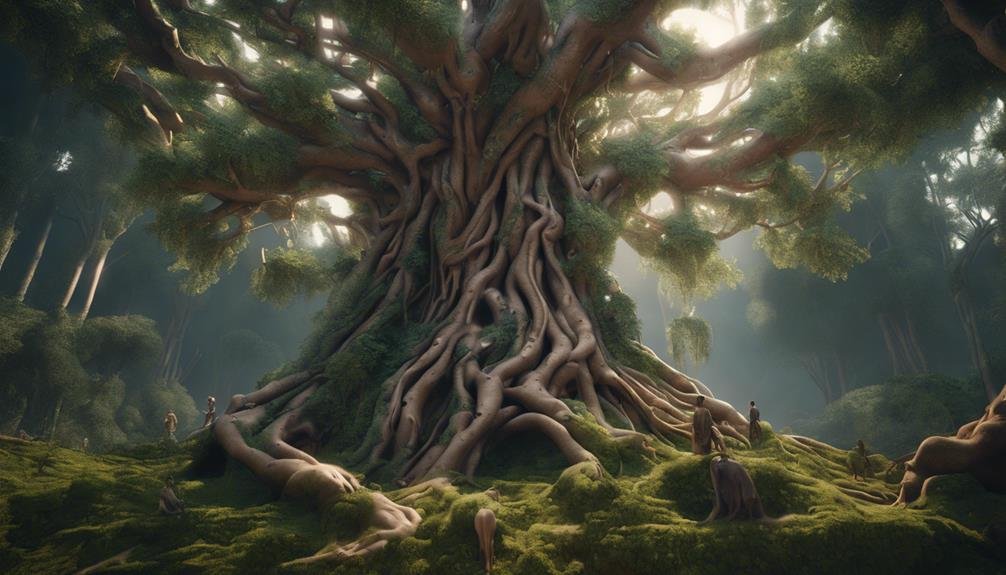Jung’s Concept of the Collective Unconscious
Explore the depths of Jung's concept of the collective unconscious, where hidden domains of shared human experiences and ancient wisdom await your discovery. Uncover the mysteries of universal symbols and archetypes that shape not just your perceptions but those of the entire human race. Immerse yourself in the interconnected web of humanity's psyche and discover how this collective unconscious influences your thoughts, dreams, and behaviors in ways you may have never imagined. The journey into this shared reservoir of human consciousness promises to reveal insights that could transform your understanding of yourself and the world around you.
Key Takeaways
- Collective unconscious: Inherited psychological material shared by humanity.
- Archetypes: Universal patterns in the human psyche.
- Symbols: Bridges between conscious and unconscious realms.
- Cultural influences: Shape the contents of the collective unconscious.
- Foundation of analytical psychology: Understanding the human psyche.
Origins of the Collective Unconscious
The origins of the collective unconscious can be traced back to the pioneering work of Swiss psychiatrist Carl Jung in the early 20th century. Jung proposed that the collective unconscious is a reservoir of shared, inherited psychological material that all humans possess, containing universal symbols and archetypes.
Evolutionary psychology plays an important role in understanding the development of the collective unconscious. It suggests that certain psychological traits and mechanisms could have evolved over time to aid in human survival and reproduction, contributing to the formation of collective symbolic representations.
Moreover, cultural influences play a significant part in shaping the contents of the collective unconscious. Cultural beliefs, myths, and traditions contribute to the collective pool of symbols and archetypes that are shared among individuals within a society.
These cultural elements become ingrained in the collective unconscious and influence human behavior, thought patterns, and emotional responses. As a result, the origins of the collective unconscious can be seen as a blend of evolutionary psychology and cultural influences, shaping the universal aspects of human psyche.
Archetypes and Symbols
An exploration of archetypes and symbols reveals the fundamental building blocks of the collective unconscious, providing insights into the shared psychological heritage of humanity. Archetypes serve as symbolic representations of universal patterns deeply embedded within the human psyche. These archetypes, such as the mother, the hero, or the shadow, aren't only prevalent in individual dreams and myths but also resonate across different cultures and time periods.
Symbols, on the other hand, play a vital role in psychological exploration, offering a gateway to understanding the deep symbolism present in the collective unconscious. They act as bridges between the conscious and unconscious territories, allowing individuals to access hidden aspects of their psyche.
Role in Analytical Psychology
Playing an essential role in analytical psychology, the concept of the collective unconscious serves as a foundational framework for understanding the depths of the human psyche. Within this framework, dream analysis plays a vital role. Dreams are seen as manifestations of the collective unconscious, containing symbols and archetypes that provide insights into an individual's innermost thoughts and emotions. By analyzing dreams, individuals can uncover unconscious aspects of themselves, leading to a deeper understanding of their psyche and facilitating personal development.
Moreover, the concept of the collective unconscious is integral to personal development within analytical psychology. Jung believed that by exploring and integrating the contents of the collective unconscious, individuals could achieve individuation – a process of self-realization and wholeness. Through delving into unconscious material, individuals can confront and work through unresolved conflicts, traumas, and complexes, leading to personal growth and a more authentic sense of self.
Essentially, the collective unconscious serves as a rich source of material for psychological exploration and transformation within the domain of analytical psychology.
Unconscious Communication
Utilizing non-verbal cues and subtle gestures, individuals engage in unconscious communication that conveys underlying emotions and intentions. Nonverbal cues play a significant role in transmitting messages beyond spoken words.
Shared experiences often create a basis for this form of communication, where mutual understanding enhances the exchange of emotions. Through body language, facial expressions, and tone of voice, individuals unknowingly communicate their feelings, beliefs, and attitudes. This unconscious mode of communication can either complement or contradict verbal expressions, providing additional layers of meaning for interpretation.
Nonverbal cues, such as eye contact, hand gestures, and posture, can reveal more about a person's true feelings than words alone. Shared experiences act as a foundation for this type of communication, as common backgrounds can lead to a deeper level of understanding between individuals.
In social interactions, unconscious communication based on nonverbal cues often serves as a subtle yet powerful means of expressing emotions and intentions, enriching human connections beyond explicit dialogue.
Applications in Modern Psychology
The application of unconscious communication theories in modern psychology enables a deeper understanding of human behavior and interpersonal dynamics. In clinical practice, the concept of the collective unconscious can be utilized to explore the root causes of psychological issues that individuals may face. By tapping into the shared reservoir of archetypes and symbols present in the collective unconscious, therapists can help patients uncover hidden motivations and unresolved conflicts that influence their thoughts and behaviors.
Moreover, cultural influence plays a significant role in the application of Jung's concept of the collective unconscious in modern psychology. Cultural norms, beliefs, and values shape the collective unconscious of a society, impacting how individuals perceive themselves and interact with others. Understanding these cultural influences can aid psychologists in providing more effective therapy that considers the broader societal context in which individuals exist.
Conclusion
To sum up, Jung's concept of the collective unconscious provides a fascinating framework for understanding the shared psychological heritage of humanity. By delving into archetypes and symbols, individuals can uncover hidden depths of their psyche and gain insights into their personal development.
Like a compass guiding you through the labyrinth of the mind, exploring the collective unconscious can help you navigate the complexities of your inner world and ultimately lead to self-discovery and growth.







